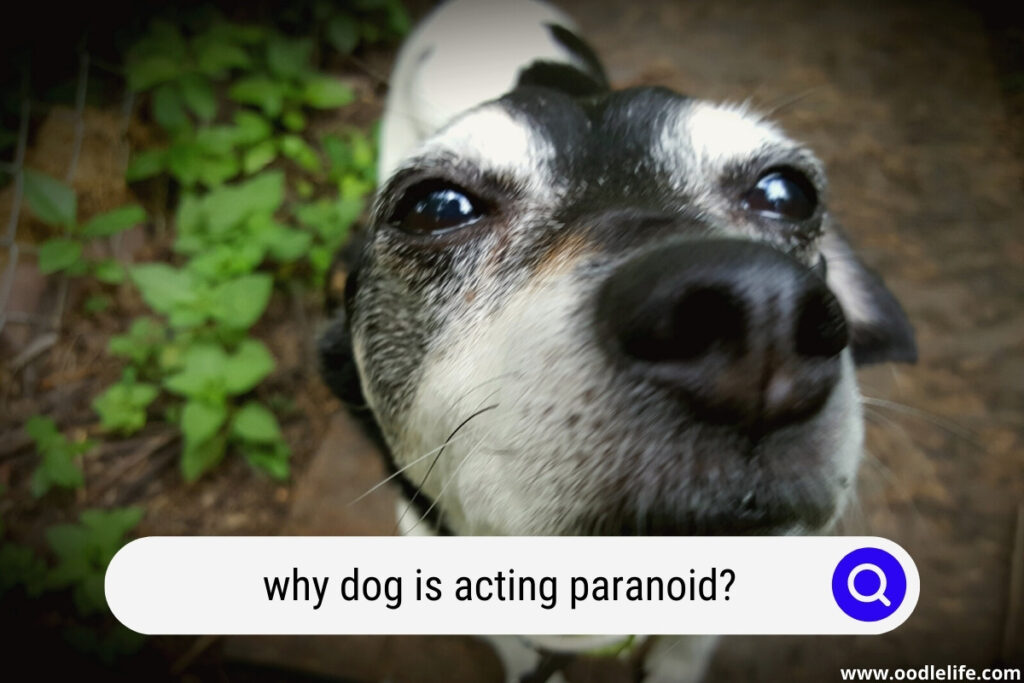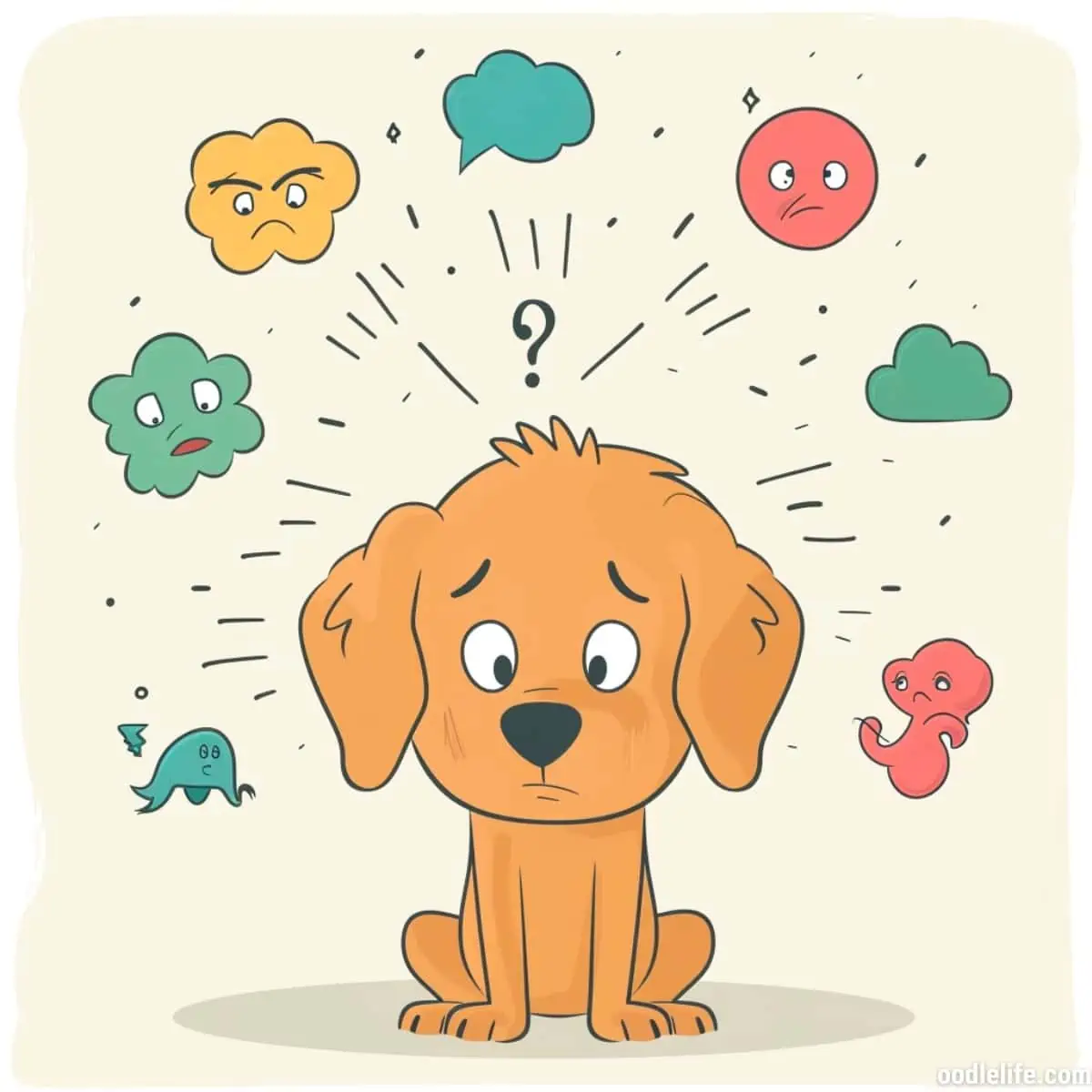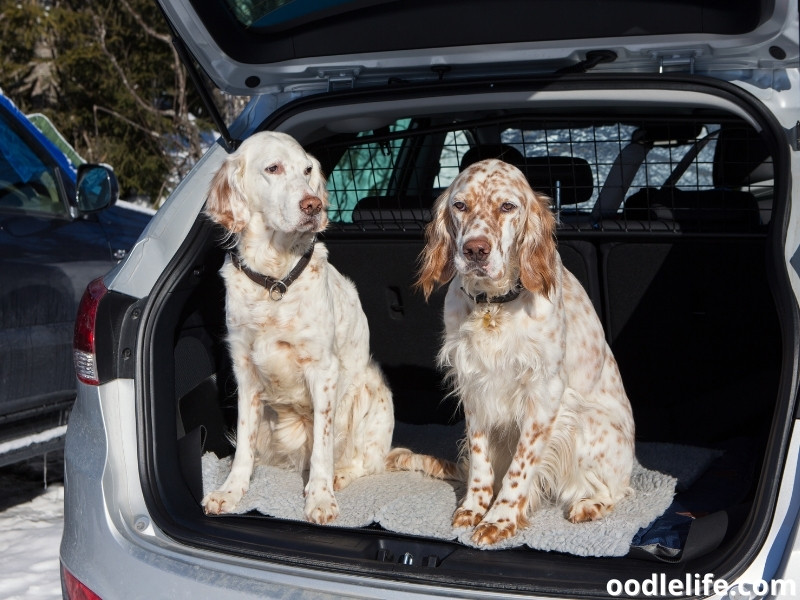Why Is My Dog Acting Paranoid All of a Sudden? (8 SIGNS)
You know how dogs can take one whiff of us and know instantly what we are thinking and feeling? We have the same superpower, just not to that incredible degree.
Dogs are our best friends, and we can always tell when something is off with them. Did you know that dogs can suffer from paranoia just like people? Just as humans can develop irrational fears, dogs can too.
If you notice your dog suddenly become afraid of things that they used to be fine and dandy with, it could be a sign that there’s an onset of paranoia on its way.

Key Takeaways
- Dogs show paranoia through clinginess, whining, hiding, dilated pupils, involuntary peeing, cowering, trembling, and yawning.
- Causes include fear, trauma, poor socialization, health issues, and genetics.
- Sudden paranoia can arise from environmental changes, new animals, intruders, illness, or aging.
- Separation anxiety can exacerbate paranoia, leading to destructive behaviors when alone.
- Treatments include crate training, calming supplements, and behavioral training to ease anxiety.
- Addressing paranoia’s root causes improves a dog’s well-being and security.
If you notice any drastic changes in your dog’s behavior, it’s important to take them to the vet so they can rule out any medical causes and get them the help they need. In this blog post, we’ll look at paranoia in a dog and how you can help allay their fears.
How Does A Dog Show Paranoia? (8 Ways)

There are certain indicators that depict that your dog may be paranoid such as changes in your dog’s body language and behavior.
Excessive clinginess – If you notice your dog is exceptionally clingy and doesn’t want to leave your side, they may be scared or anxious.
Prolonged whining – If you notice your dog has been whining or whimpering excessively this can be a sign of fear and this may be to soothe themselves or to get your attention. They may also bark incessantly.

Hiding – When dogs are scared they may tense up and find somewhere to hide and find comfort.
Changes in your dog’s eyes – When they are in situations where they feel stressed or anxious their pupils may become dilated and the white area of the eyes may become more visible than normal.
Lack of bladder control – They may not be able to control their bladders and pee involuntarily as a result of fear and anxiety.
Cowering – This is a very obvious indicator, when dogs cower they crouch down to make themselves appear smaller due to fear and anxiety. They may also tuck their tail between their rear legs.
Trembling – Similar to humans, dogs tremble when they are scared, you will see them shaking as if they were cold.
Yawning– Dogs may yawn for several reasons other than fear, such as being tired. Though this may be a less noticeable indicator, a stressful yawn is longer and more intense than a regular yawn.
Reasons Your Dog May Be Paranoid (Top 5)
Paranoia refers to intense feelings of fear and anxiousness. This could be an irrational fear of something, someone, or even non-existing threats. Although this type of behavior is usually mentioned in humans it can also be present in dogs.

Some paranoid behaviors, like being nervous, can even just be a part of a dog’s natural personality or they may be more introverted and have a shy and nervous disposition. Some reasons your dog may be experiencing some paranoia include:
Fear – One of the most common reasons why a dog may act paranoid is because they are scared of something. Common things that bother most dogs include thunder, gunshots, fireworks, and vacuum cleaners.
They also can be scared of people that seem suspicious, objects, and certain smells.
Past trauma – Traumatic experiences your dog may have had in the past can cause them to be paranoid.
Dogs that may have been abused in the past can be triggered by anything or anyone that may remind them of this, or even certain smells that may be attached to a bad experience.
Lack of proper socialization – It is important to give your dog exposure to various stimuli from an early age and giving them this exposure will desensitize them to potential triggers.
You can do this by walking your dog regularly and taking them to new places. If they haven’t been socialized properly and exposed to certain stimuli there is a high probability that they are easily triggered.

Health issues – Twitchiness or edginess could also be an indicator that your dog is sick or has health-related issues.
Genetic Predisposition – Each breed has its own unique personality. Some dogs are known for being particularly friendly, while others tend to be more independent. However, one trait that is not always immediately apparent is nervousness.
Some breeds of dogs are innately more nervous than others, and this can make them difficult to train and care for. The reason for this difference is not fully understood, but it is thought to be related to the dog’s original purpose.
Regardless of the reason, it is important to be aware of your dog’s natural temperament before bringing them home. Otherwise, you may find yourself with a pet that is constantly on edge and in need of extra attention.
What Could Cause Sudden Paranoia? (5 Explanation)
If your dog has always been a stable, happy-go-lucky pooch but suddenly exhibits strange, perplexing behaviors and seems paranoid, it might also be due to what is going on around him.
Changes in their environment – Try to think of any new changes that you have made in your dog’s environment, whether it be a new person in the house or a new object.
A change in living situation, such as moving to a new house or apartment, can be a cause of paranoia in some people. This is because the new environment may be unfamiliar and therefore perceived as threatening.

Other dogs around – Dogs have a good sense of smell and they can pick up on certain scents that humans can’t. If your dog picks up the scent of another dog or predator nearby this can cause them to react and display paranoid-like symptoms.
Intruders – If your dog detects a strange scent in your home or on your clothes that he doesn’t agree with, he might become nervous and paranoid.
Your dog may be ill – Your dog may have gotten sick and has contracted some kind of illness which can cause a sudden change in their behavior causing them to act paranoid.
Aging dog – A senior dog getting older might have a harder time navigating around the house. As they age, their vision, hearing and sense of smell can worsen. In addition, they can become lost and confused more easily. They may also be less trusting of strangers, and more hesitant to approach new situations.
Can Separation Anxiety Cause Paranoia?
An extremely common condition in varying degrees, separation anxiety can cause paranoia in dogs.

What Is Separation Anxiety?
If you’ve ever spent time away from your dog, you may have noticed them acting a bit differently when you return. Maybe they were extra clingy or didn’t want to let you out of their sight. This behavior is often chalked up to excitement or happiness at seeing you again, but it could also be a sign of separation anxiety.
Separation anxiety is a common problem in dogs, and it can be tough to deal with. Dogs are social animals, and they generally prefer to be around their humans. When they’re suddenly left alone, it can be stressful for them.
Separation anxiety can manifest itself in different ways, including barking, howling, whining, pacing, chewing on furniture or other objects, and going to the bathroom inside even when housetrained.
When a dog is left alone, it may start to experience anxiety which can lead to paranoid thoughts and behaviors.
They may also become withdrawn and refuse to eat or drink. If left untreated, separation anxiety can cause serious health and behavioral problems for your dog.
Thankfully, there are treatments and training available that can help your dog to cope with their anxiety and live a happy and healthy life.
Helping With Paranoia and Anxiety
Crate training – This is very helpful for treating separation anxiety in dogs. It can provide your dog with a safe space where they can find comfort. The principle behind this is to ensure that your dog associate’s its crate with all things good.

You can make sure the crate is comfortable for your dog by putting bedding inside the crate and including some of their favorite toys. Let them spend time alone in their crate for a few hours each day so they get comfortable with the idea of being alone.
Calming Supplements – There are some natural remedies you can use to treat your pet’s separation anxiety such as valerian root, chamomile, and passion flower, which all have calming properties that can help with anxiety. You can also consider pheromone wall plug-ins or calming collars.
Behavioral training – You can take certain steps to promote independence in your pet. Start by spending short periods of time away from your pet. When you’re leaving the house or coming back home don’t make a big deal out of it. Avoiding greeting and acting overjoyed to see them when returning back home. Putting this into practice encourages the idea that you leaving and returning shouldn’t be a big deal.
Final Thoughts
Being constantly paranoid can’t be fun for anyone, whether dog or human. By understanding what is causing the paranoia then taking steps to allay their anxiety, you can help your beloved pooch lead a happier, healthier life!